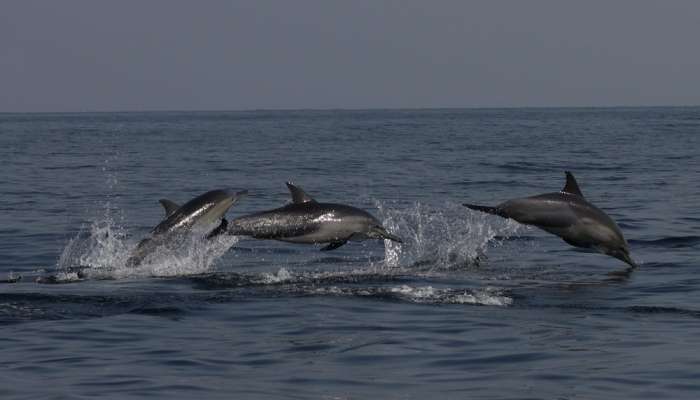The fourth phase of the marine mammal survey project in Khasab, Musandam Governorate, has officially begun on Tuesday, led by the Environment Authority in collaboration with other government departments. The project, lasting until October 31, 2024, aims to create a detailed database of marine mammals at the National Nature Park in Musandam, including a distribution chart of species within the reserve. Engineer Aida bint Khalaf Al Jabriya, head of the project team, highlighted the importance of monitoring and searching for marine mammals in the area.
The project team employs various methods to track and document marine mammals, such as monitoring surface spots, dark objects, and birds hovering in specific areas known for fish presence. They use advanced technology to record data electronically, including sighting location, date, time, species type, group size, and behavior. High-quality cameras, drone cameras, and GoPros are used to photograph the sightings, along with recording sounds of marine mammals and measuring physical factors like depth and wind speed.
Hamad bin Salem Al-Hussaini, an Environmental Systems Technician, emphasized the rich variety of marine mammals in Oman due to its strategic location overlooking multiple seas. The Environment Authority is committed to studying and analyzing data to understand the presence and reproduction of marine mammals, ensuring their protection from potential risks. The involvement of local fishermen in documenting marine mammals through photos, videos, and observations has been crucial, leading to the discovery of large and diverse populations in different locations.
Musandam’s unique marine ecosystem, overlooking the Arabian Gulf, the Sea of Oman, and the Arabian Sea, makes it a prime location for diverse marine mammal species. The Sultanate of Oman’s efforts to study and protect these creatures demonstrate a commitment to safeguarding the marine environment’s health and ecosystems. By involving fishermen in the survey process, the project aims to gather comprehensive data on marine mammals, contributing to their conservation and preservation for future generations to appreciate and enjoy.
The survey’s detailed approach includes recording sighting locations, behaviors, and group sizes of marine mammals, as well as utilizing advanced technology for data collection and analysis. With the support of the Environment Authority and other government entities, the project team works tirelessly to track and document marine mammals’ movements and behaviors in the National Nature Park. By engaging local communities in the survey process, the project fosters a sense of stewardship and environmental awareness, encouraging sustainable practices for the benefit of both marine life and human populations.
In conclusion, the marine mammal survey project in Khasab, Musandam Governorate, plays a vital role in protecting and conserving the diverse marine life found in the region. Through collaborative efforts with government departments, local fishermen, and advanced technology, the project aims to create a comprehensive database of marine mammals to better understand and safeguard these unique creatures. By promoting environmental awareness and stewardship, the project contributes to the long-term health and sustainability of Musandam’s marine ecosystems, ensuring the well-being of both marine life and local communities.










